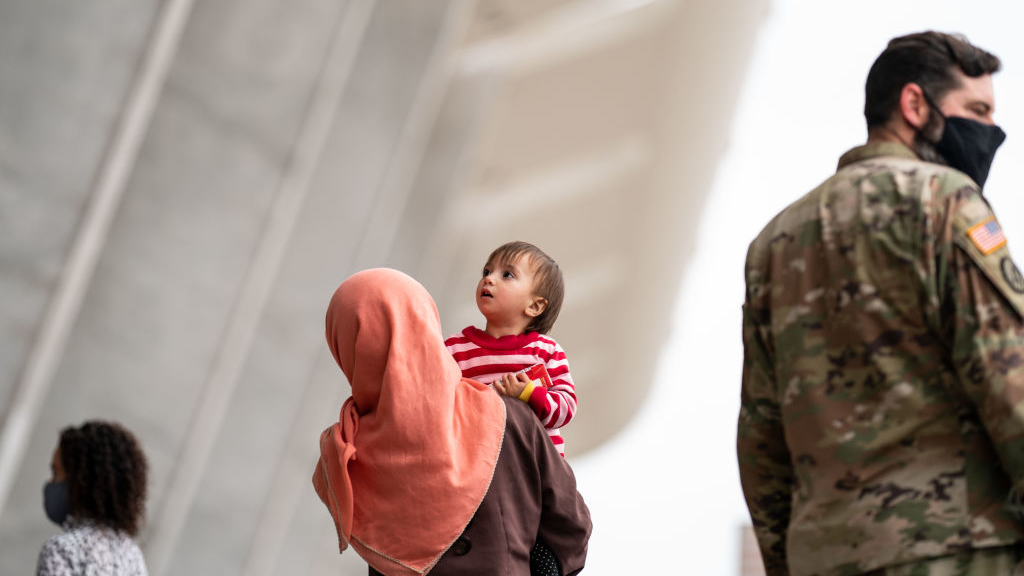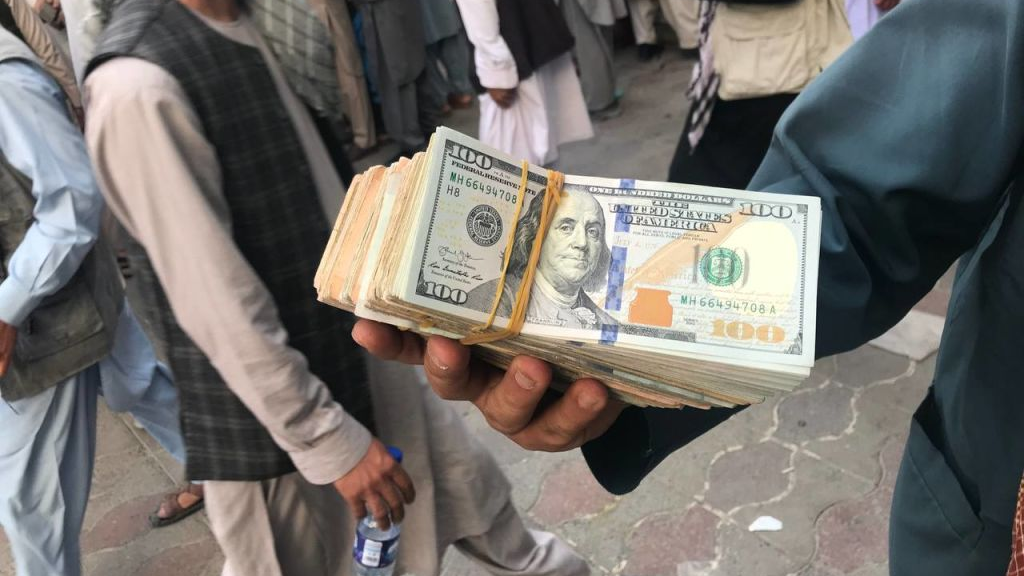
Evacuees who fled Afghanistan walk through the terminal to board buses that will take them to a processing center, at Dulles International Airport, Virginia, U.S., August 31, 2021. /Getty
Evacuees who fled Afghanistan walk through the terminal to board buses that will take them to a processing center, at Dulles International Airport, Virginia, U.S., August 31, 2021. /Getty
Editor's note: Mariam Shah is an Islamabad-based independent researcher in the field of conflict studies and military psychology. The article reflects the author's views, and not necessarily those of CGTN.
Before dawn of August 31, the last U.S. plane flew out of Afghanistan, marking an end to American supremacy on Afghan soil. The entire withdrawal turned out to be a nightmare for the U.S. policymakers, Afghan public and soldiers on ground.
Unfortunately, due to the short-sightedness and impudence, the entire chronicle turned debacle is laden with misadventures, blood, destruction, war crimes and policy blunders, making it an ignominious war and withdrawal. Afghanistan will suffer for a longer duration as a result of an unethical and irresponsible withdrawal.
Something that still bothers me is that even after all this loss the U.S. won't learn the lesson. The reason being, U.S. policymakers never learned it before, even through the hard way. In modern times, the U.S. has waged wars outside its territory.
First, it was Vietnam, then Lebanon and Afghanistan, followed by Iraq. War devastates a country from within, shatters the core fabric of society, and severely impacts the economy and infrastructure, giving both physical and psychological wounds to the masses.
Somehow, the present generation in the U.S. is unaware of the horrors of war. As the U.S. ended its mission, a lot of Afghans feel betrayed, especially the ones who helped the U.S. administration and somehow are left behind during the evacuation phase.
A lot of U.S. and NATO war veterans are in shock and critical of what exactly happened, as the rebuilding process and counterterrorism efforts for the last 20 years burst like a bubble in seconds. For many, the question "was it worth it" will remain there for years to come.
Lessons learned
There are few lessons for the global powers here. Solutions for critical global issues, including armed struggles and violence should be political rather than military oriented. Military power and prowess is one tool, weapons can't win wars and bring reforms in the longer run.
War without a clear strategy and motives is destined to fail miserably even after two decades and spending billions. Besides, knowing the indigenous culture, societal norms and mass psychology is very important. It is high time that this region, players, subjects and the war should be studied from a different lens and not just typical blame game rhetoric.

A person shows U.S. dollar banknotes outside an exchange office that had closed since August 15, after Taliban takeover in Kabul, Afghanistan, September 4, 2021. /Getty
A person shows U.S. dollar banknotes outside an exchange office that had closed since August 15, after Taliban takeover in Kabul, Afghanistan, September 4, 2021. /Getty
Every other country in the world doesn't require the U.S. version of democracy. The West doesn't have to teach their "civilization" to everyone. Looking at the present situation in Afghanistan, the U.S. should have learned this lesson by now.
Blaming allies won't do any good in the long run. The U.S. should accept its mistakes rather than abandoning the war-torn country or reconstructing the accounts altogether. Europe might also have learned a lesson here; not to support the U.S. in every misadventure in the future and when to shake hands with allies.
Afghanistan is beyond Kabul, Herat and Mazar. The focus of the allied forces and the reconstruction process was mainly centered in these cities which revealed the facade of development, fractures in the government machinery and the endemic corruption of the Afghan political elite that actually proved why the Taliban took only a few days to capture the entire country.
The international community, especially the United Nations, should devise a strategy for the future now. No superpower should be allowed to abandon a country. Occupational forces should make sure the country they are leaving is in a better state than before, with a proper working security mechanism.
Relocating refugees is a very short-term strategy. The U.S. should have ensured a safe Afghanistan so that educated, middle-class Afghans could stay and work toward a progressive country, rather moving out and settling elsewhere.
The way forward
The Taliban were and are a reality; the West should accept this fact now. It's time for the world to understand the Taliban as an important stakeholder in Afghanistan for sustainable peace building and reconstructive efforts. Global powers should devise a working strategy to harness trust between the Taliban and other political factions in Afghanistan.
The world must come forward and devise a plan to help the Afghan people, in order to curtail a looming humanitarian crisis. The Afghan people need the support of the international community more than ever to survive, sustain and grow.
The reconstruction and rehabilitation process should be Afghan focused with international observers to monitor the funds, keeping in view the sheer dishonesty and ineptness of Afghan political elite in the last few decades.
Regional players including Pakistan, Russia and China are looking forward to having a productive working relationship with the Taliban in an all-inclusive government. To ensure that the spoilers and terrorist groups do not take advantage of the ever-emerging and unpredictable circumstances, Pakistan's DG ISI Lt. General Faiz Hameed reached Kabul on September 4 for a one-day visit to discuss the overall security situation in Afghanistan.
Earlier, Taliban spokesperson Zabihullah Mujahid, speaking at the Pak-Afghan Youth Forum's International Conference, titled "Rebuilding Afghanistan Together," reiterated that there would be no threat to Pakistan from Afghanistan and hoped that Pakistan would continue its assistance in the peace efforts with a focus on bilateral trade.
In an interview with an Italian newspaper, Mujahid said, "China will be our main partner and represents a great opportunity for us because it is ready to invest in our country and support reconstruction efforts." Earlier, the Taliban assured China that Afghanistan's soil would not be used against any country's security.
All these reassurances by the Taliban show that regional countries are looking forward to build a strong support system for Afghanistan in the coming times.
(If you want to contribute and have specific expertise, please contact us at opinions@cgtn.com.)

